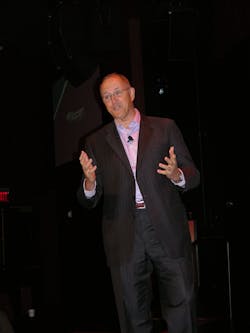Business Author Flip Flippen Urges Listeners To Recognize And Act On Personal Constraints During National Automatic Merchandising Association OneShow In Las Vegas
Attendees to the National Automatic Merchandising Association (NAMA) OneShow received some tips for how to meet the difficult challenge they face as business leaders from a renowned business coach and author during the OneShow at the Sands Exposition Center in Las Vegas.
Flip Flippen, author of “The Flip Side” and a consultant to businesses of all sizes, spoke on how to change behaviors and attitudes that stand in the way of success. Flippen began his presentation with a host of personal anecdotes to demonstrate his humble origins in Texas. While born into highly unfavorable circumstances, he managed to achieve a high level of success in his life, even though he was not born wealthy nor a gifted student.
Flippen noted that in addition to achieving a high level of success in his professional life, he has raised 20 children, of which 18 were adopted, including children from various ethnic backgrounds.
A key theme of his talk was that understanding and acting upon personal strengths and weaknesses determines the level of a person’s personal and vocational success.
In his interactive session, Flippen established that his listeners represent an exceptionally successful sampling of U.S. business owners. Asking for a show of hands, he established that the audience included a high percentage of business owners whose companies gross $1 million annually, which places them in the top 4 percent of U.S. businesses.
Flippen then gave a brief history lesson to emphasize the important role that personal initiative has played in the development of civilization. He noted that in 600 A.D., a group of priests established a barter system, from which evolved currency as a form of measuring value.
In time, a conflict evolved between those who consume and those who produce. Unfortunately, the producers were not always the rulers. In many ancient societies, merchants were viewed negatively. He noted that in 829 A.D., the emperor of Byzantium ordered merchant vessels to be destroyed because merchants were held in such low esteem. Political leaders at the time were viewed as receiving their power from higher sources.
“Nobility has forever has looked down upon us (producers),” Flippen said.
The concept of private property evolved in 1200 A.D. when merchants organized to have a voice in government. The merchants were motivated by the desire to maintain their property and not have it subject to government edict. The producers wanted to ensure they would not lose that which they produced.
Relating this history to the present time, Flippen said the biggest issue facing the country today is taxes. More specifically, he said, is the issue of who creates jobs, “and it’s you guys.”
“The government does not provided jobs,” he said. “You guys produce jobs.”
Flippen then focused on barriers to personal success.
He said everyone has personal constraints. These constraints make it hard to adapt to change. Such a constraint might be the need for a lot of data before making a decision. “Is your self control (in such an area) too high?” he asked.
Flippen noted a person cannot rise above the constraints he or she has if they do not address them.
Personal constraints, he noted are “role specific.” In his case, as a student, he was poor in math. This was something he needed to address to become successful. To address it, he needed to be aware of it.
Personal constraints play themselves out in every aspect of a person’s life. Flippen said many people in high positions make a distinction between personal and public actions. He called this a fallacy. He said the only time someone invokes this position is when they “have done something seriously stupid.”
“The issue is your integrity,” he said.
In the end, he said, people with the least personal constraints are the winners. “You can’t be successful if you add constraints to your life,” he said.
Two laws of leadership he noted are:
1) No organization can rise above constraints of leadership.
2) Those who are unwilling to address their personal constraints are unfit for leadership.
To recognize constraints, Flippen said one only has to measure their behavior. Measurable behaviors include: dominance, competitiveness, self control, and the ability to listen respectfully.
